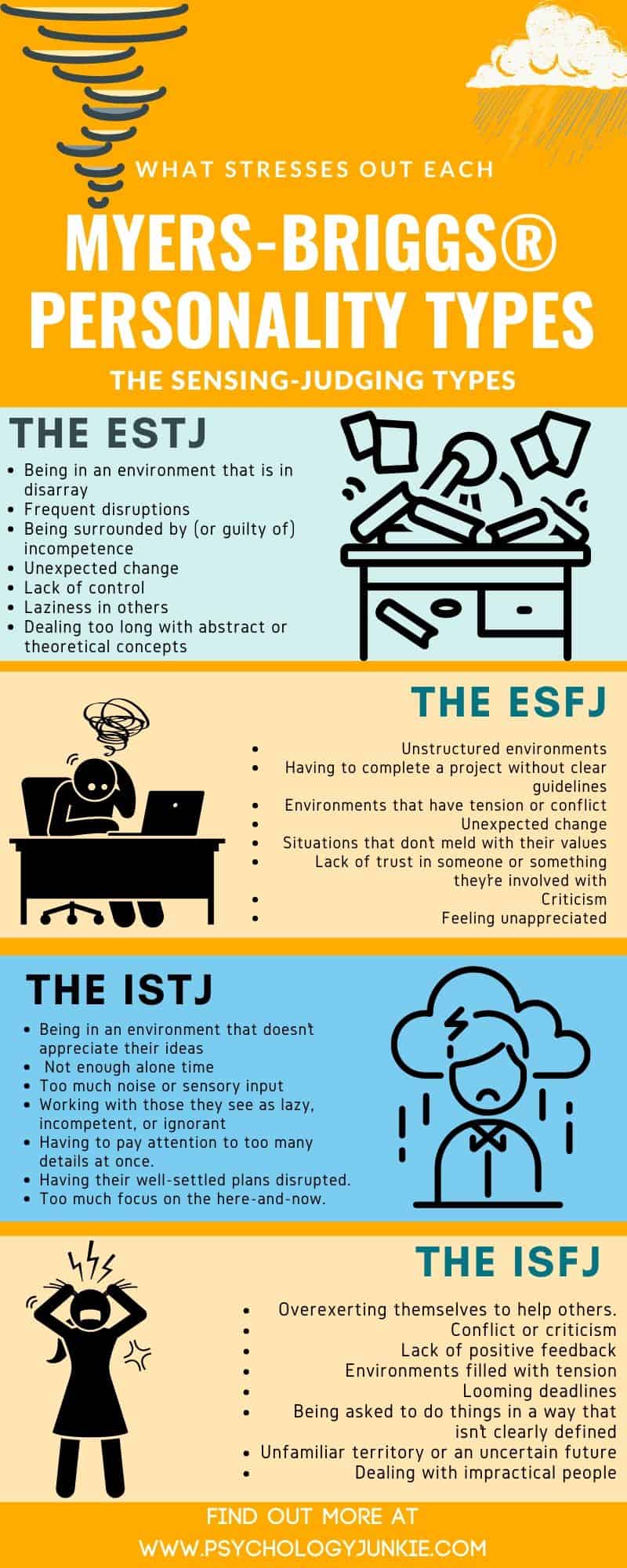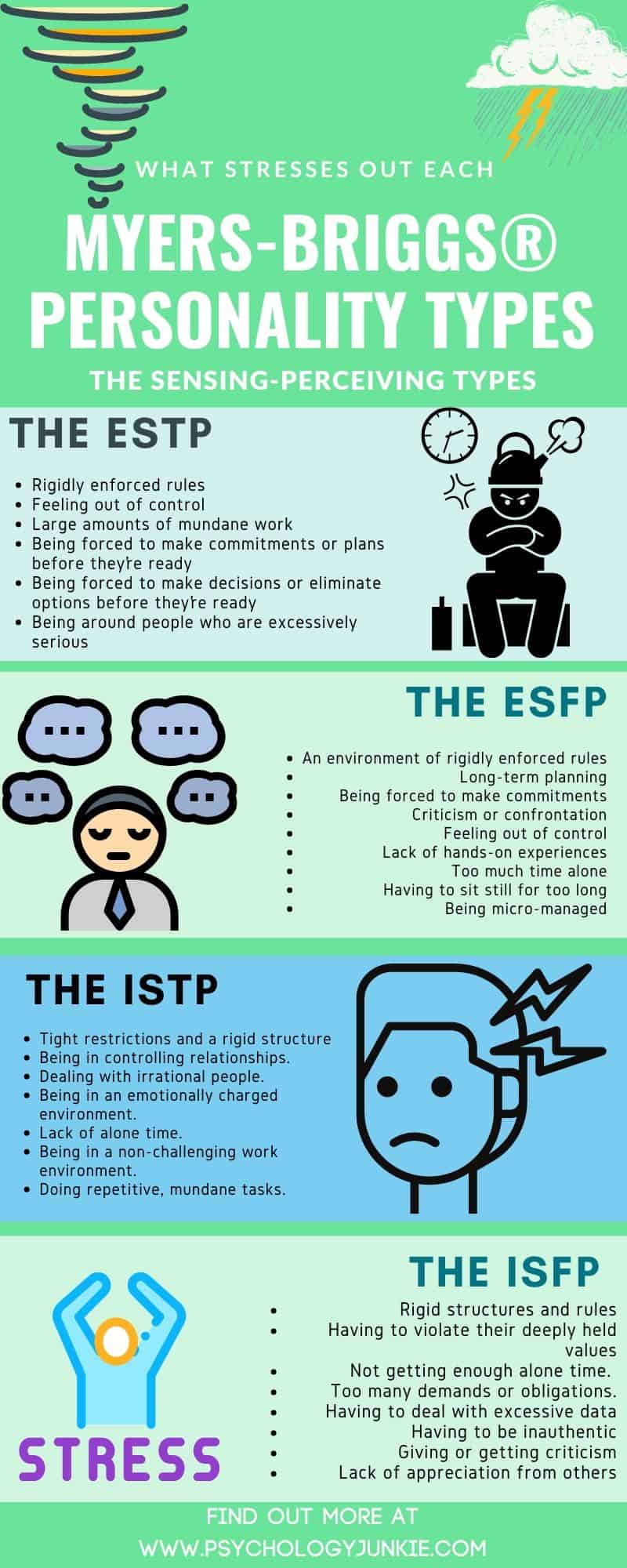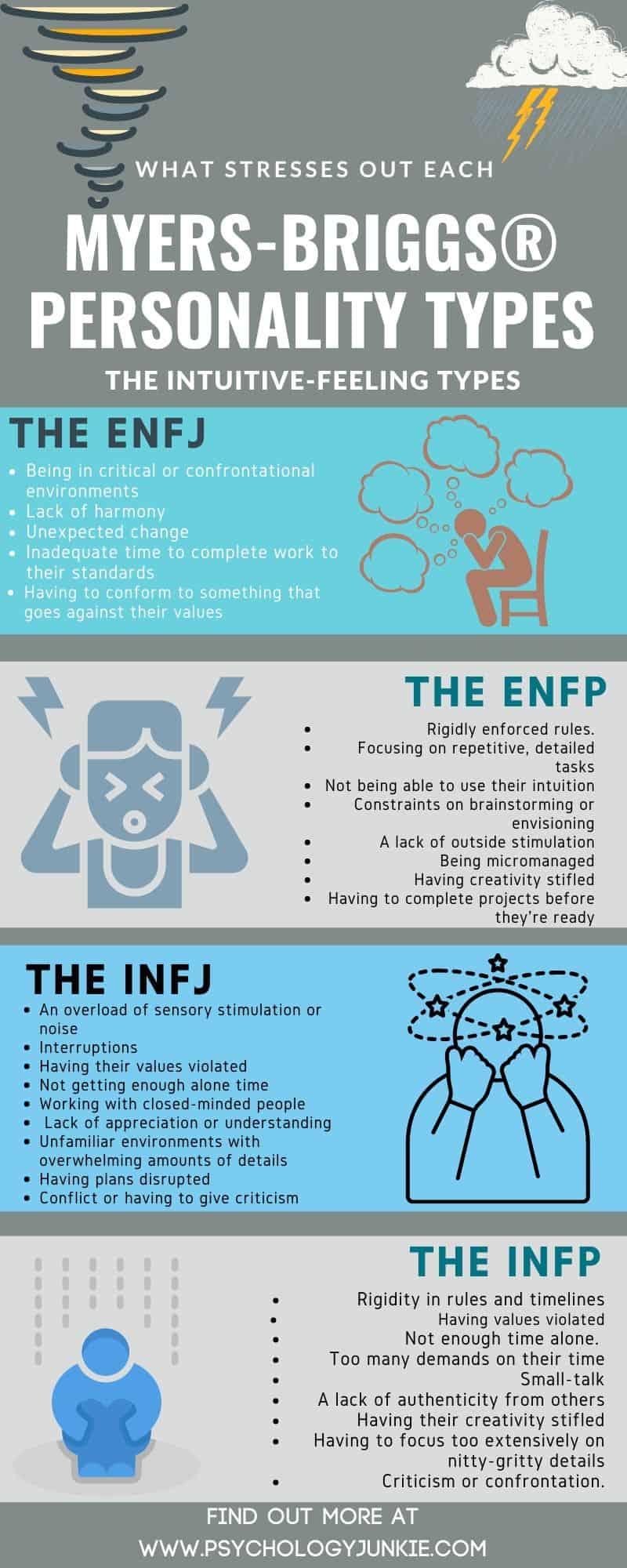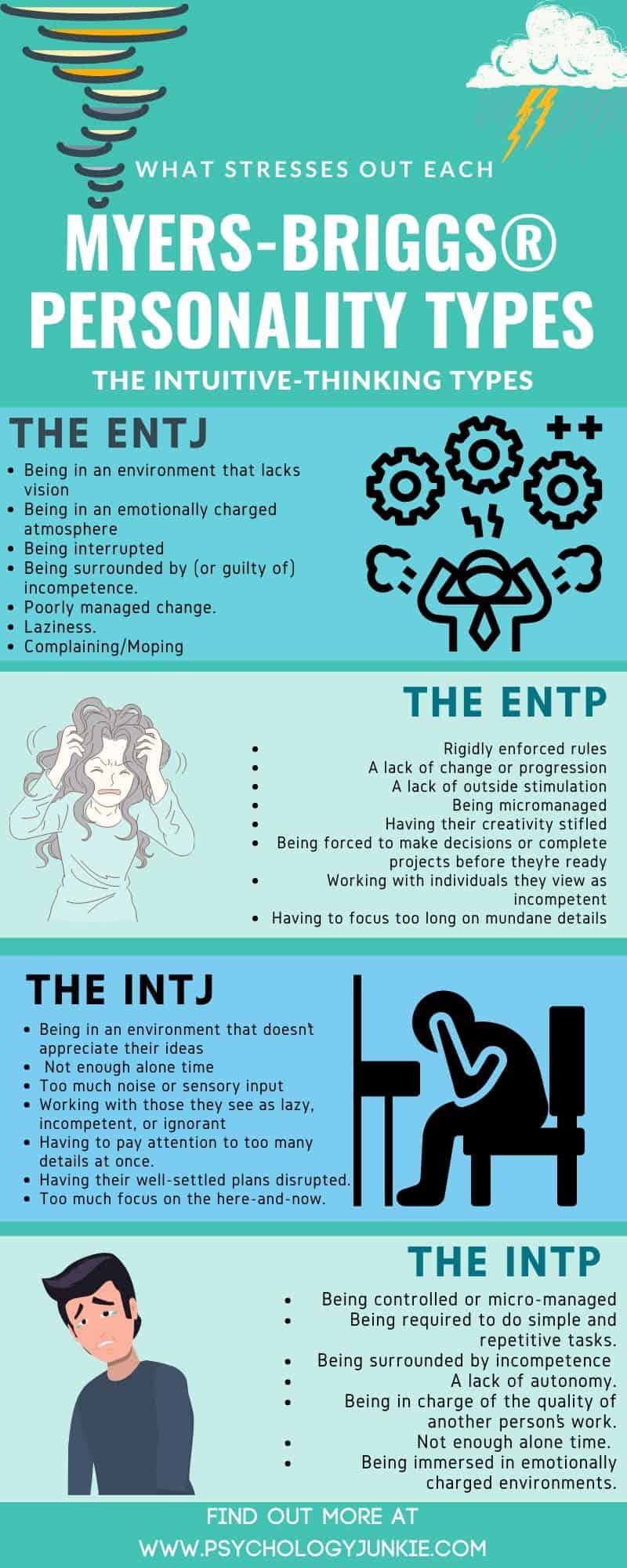How Each Myers-Briggs® Type Reacts to Stress (and How to Help!)
Do you ever wonder what makes each Myers-Briggs® type stressed? Have you ever become so overwhelmed that you feel out of control? Do you feel like you’re acting in a way that is completely unlike you? Have you ever tried to help a loved one who is stressed out, and everything you’ve said or done has only made things worse?
I know I have. Everyone reacts to stress differently and needs different things to calm them down. What works for you may not work for your spouse, your child, or your friends. This blog will hopefully give you some practical, easy ways to help you and the ones you care about handle stress more effectively and quickly.
This post is incredibly long, so by all means just scroll down to the personality type you’re looking for! I’d like to go into more detail about each MBTI type and stress in the future, but for now, this is a great way to get an overview and pinpoint some solutions to reducing your stress and helping out others in your life.

Not sure what your personality type is? Check out our new personality questionnaire!
Table of contents
Estimated reading time: 29 minutes
What Makes Each Myers-Briggs® Type Stressed? Let’s Find Out!

ESTJ Stress
What stresses out an ESTJ:
- Being in an environment that is in disarray
- Frequent disruptions
- Irrational behavior
- Being surrounded by (or guilty of) incompetence
- Unexpected changes
- Lack of control
- Laziness in others
- Not having their strongly held values validated
- Guilt over being critical towards others
- Dealing too long with abstract or theoretical concepts
- Being in a highly-charged emotional environment for too long
When overwhelmed by stress, ESTJs will try to harness all their energy and resources to solve the problem. They may become more commanding, work-oriented, and focused on organizing the world so that the problem can be solved.
If stress continues, ESTJs often feel isolated from others. They start to feel as if they are misunderstood and undervalued and that their efforts are taken for granted. Many times they become overwhelmed by their sheer workload and the amount of responsibilities they naturally tend to take on. Suddenly they feel as if everyone has abandoned them and taken their hard work for granted.
During these times, ESTJs have a hard time putting their feelings into words and communicating them to others. If they are under frequent, chronic stress, they may fall into the grip of their inferior function; Introverted Feeling (Fi). When this happens, they can develop a “martyr complex.” They tend to become uncharacteristically emotional, withdrawn from others, and hypersensitive about their relationships. Physically, they may feel tension headaches or neck and shoulder aches from repressed stress.
How to help an ESTJ experiencing stress:
- Give them some time to be left alone during and immediately after an incident.
- Avoid directly attacking the problem right away.
- Help them break down larger projects into smaller pieces.
- Listen to them. Let them talk it out.
- After some time of listening, discuss information or ideas that could lead to solutions.
- Validate their feelings.
- Don’t be overly-sympathetic.
- Don’t respond emotionally.
- Clean up the house or take care of some practical chores that are looming.
- Make the environment as organized as possible (without putting things away in unfamiliar locations).
Related: 12 Extremely Annoying ESTJ Pet Peeves
ISTJ Stress
What Stresses out an ISTJ:
- Being in an environment that is in disarray
- Looming deadlines
- Being forced or asked to do things that don’t make sense to them
- Being asked to do something without a plan or direction
- Frequent change
- Having to innovate without any past experience to rely on
- Being asked to do something spontaneously
- Too much extraversion (excess people contact)
- Emotionally charged situations
- Unfamiliar surroundings
- Dealing too long with abstract or theoretical concepts.
When faced with stress overload, ISTJs will initially try to solve everything by looking at what has worked for them in the past. They’ll seek out advice from credible sources or try to scan their memory for solutions they’ve used before. Next, they’ll look for ways to organize and structure their environment and tasks so that the issue they’re facing can be organized or dealt with in a logical way.
If stress continues, ISTJs tend to fall into “catastrophe mode.” During this time they’ll see nothing but all the potential things that could go wrong. They may beat themselves up for things they wish could have done differently in the past or duties they failed to perform. Instead of their normal calm and competent manner, they’ll feel foggy and overwhelmed by bleak futures. Under chronic stress, they may fall into the grip of their inferior function, Extroverted Intuition (Ne). When this happens, they become uncharacteristically dramatic. They may become intensely angry and rigid in what they’re doing. They might seem critical, pessimistic, and overwhelmed with fear of the future.
How to help an ISTJ experiencing stress:
- Give them plenty of space.
- Listen, and provide provable affirmation of how they’ve overcome or done something well in the past.
- Break a task down into manageable pieces.
- Do not give generalized compliments.
- Put things that have to be done in sequential order.
- Don’t brainstorm. If they are in the grip of their inferior function, extroverted intuition, brainstorming will only make things worse.
- Don’t give them more to do. Give them a break from responsibilities if possible.
- Take them seriously. Don’t patronize or judge them.
- Go on a walk with them
Related: 10 Things That Terrify ISTJs
ISFJ Stress
What stresses out an ISFJ:
- Overexerting themselves by saying “yes” to too many projects.
- Conflict or criticism
- Lack of positive feedback
- Environments filled with tension
- Looming deadlines
- Being asked to do things in a way that isn’t clearly defined
- Having to overuse their type by having to constantly act as “the responsible one”
- Dealing too long with abstract or theoretical concepts.
- Unfamiliar territory or an uncertain future
When faced with stress, ISFJs first try to scan their memories for solutions that they might have used before. They may reach out to others to try to find solidarity, comfort, or empathy. But if stress continues, they tend to fall into “catastrophe mode”. During this time, they start to imagine all the things that could go wrong. Often they feel inadequate and overwhelmed by looming possibilities that they feel they have no strength to overcome. They may feel that everything is all wrong, or that they can’t do anything right. If they are in a state of chronic stress, they may fall into the grip of their inferior function, extraverted intuition. When this happens they may start acting completely out of character. They may be at odds with normally relied upon facts and details, they may see everything as awful and feel “doomed”. Instead of their usual calm, friendly demeanor, they may become withdrawn, angry, irritable, and pessimistic. They will probably feel emotionally overwhelmed and find themselves worrying about all kinds of horrible possibilities.
How to help an ISFJ experiencing stress:
- Give them space or time alone to work through their feelings.
- Provide provable affirmations about ways they’ve overcome situations like this in the past.
- Help them break down problems into manageable pieces
- Don’t give generalized compliments. Make compliments specific.
- Put a problem or task in sequential order.
- Don’t brainstorm. When they are in the grip of extraverted intuition, this will only make things worse.
- Let them engage their auxiliary extraverted feeling by reading materials that are personally moving, or spiritual.
- Encourage them to get some physical exercise (without making it sound like an insult).
- Let them talk about their irrational fears or feelings, and give them quiet, calm reassurance.
- Take them seriously. Don’t patronize or judge them.
Related: The Childhood Struggles of ISFJs
ESFJ Stress
What stresses out an ESFJ:
- Unstructured environments
- Having to do things that involve abstract, theoretical concepts
- Environments that have tension or conflict
- Unexpected change
- Inadequate time to complete work to their standards
- Tense, or confrontational relationships or situations
- Situations that don’t meld with their values
- Lack of trust in someone or something they’re involved with
- Criticism
- Feeling unappreciated
When faced with stress, ESFJs initially will try to talk out their problems with people they love. Talking it out, finding support, and being able to work out their problems out loud can be very helpful this type. However, if stress continues, ESFJs can become critical and overly sensitive, imagining bad intentions where there weren’t any. Being prone to insecurity, they can focus all their attention on pleasing those who give them security. This may lead them to become staunchly attached to a toxic relationship, structure, or belief system that provides them some sort of affirmation or security.
Another symptom of extreme stress in the ESFJ is a tendency to become dramatic, finding fault with almost everyone and everything. They can experience low energy, a feeling of depression or pessimism. Instead of being their normal friendly and talkative selves, they become uncharacteristically quiet and withdrawn. If they are experiencing chronic stress, they may fall into the grip of their inferior function; Introverted Thinking (Ti). This can cause them to take on the form of “the condemned,” focusing on everyone’s flaws and all the ways they have been hurt by them and how those flaws go against their belief systems and how things “should be”.
How to help an ESFJ experiencing stress:
- Give them a change of scenery. Let them spend some time outdoors.
- Encourage them to exercise (without making it a dig at their weight or health).
- Watch a comedy with them, or engage them with some humor or lighthearted entertainment.
- Acknowledge how they feel.
- Let them talk it out.
- Remind them of their strengths and contributions.
- Don’t use logic to talk them out of stress.
- Don’t ignore them.
- Give them feedback. Talk about a similar situation you went through.
- Get them away from the environment or situation that is stressing them out.
- Give them an enjoyable book to read or a lighthearted movie to watch.
Related: 5 Ways to Annoy An ESFJ

ESTP Stress
What stresses out an ESTP:
- Rigidly enforced rules
- Having to plan far into the future
- Feeling out of control
- Being asked to complete tasks without detailed directions or processes
- Large amounts of book work, theory, or writing
- Being forced to make commitments or plans before they’re ready
- Being forced to make decisions or eliminate options before they’re ready
- Having to spend a lot of time following someone else’s rules or schedule
- Being in a situation where they have to use a lot of theoretical or intuitive concepts
- Being around people who are excessively serious
When faced with stress, ESTPs initially try to tackle the problem head on through action. They may try to find quick fixes, practical solutions, or logical explanations for what’s happening. If stress continues, they will feel a growing sense of emptiness and hollowness. Their first impulse may be to seek revenge for whatever has caused them stress. They may do this by taking out their anger on others, or on inanimate objects.
When ESTPs are in a state of chronic stress, they may fall into the grip of their inferior function, Introverted Intuition (Ni). When this happens, they become more dramatic and pessimistic than usual. They may do things that are completely out of character, losing their naturally easy-going, agreeable character and having fearful fantasies of the future. Rather than being as logical as usual, they tend to make sweeping generalizations about people and situations. They might become preoccupied with ideas of impending doom and begin to assign big meaning to small occurrences.
How to help an ESTP that is experiencing stress:
- Give them space initially or directly after the event.
- Listen to them and don’t judge if they blurt out something irrational. Just let them get it out.
- Don’t tell them how to fix it. This will only make them feel more helpless.
- Give gentle affirmations or encouragement
- Excuse them from some non-essential responsibilities
- Let them get out their frustration in a physical way; by punching a pillow, working out, or playing a sport
- Help them sort out their priorities, paying careful attention to their feelings.
Related: 5 Ways to Annoy an ESTP
ISTP Stress
What stresses out an ISTP:
- Tight restrictions and a rigid structure.
- Being in controlling relationships.
- Dealing with irrational people.
- Having to focus on theories rather than real life for too long.
- Being in an emotionally charged environment.
- Not getting enough alone time.
- Being in a non-challenging work environment.
- Doing repetitive, mundane tasks.
- Not having their personal values respected or validated.
When ISTPs experience an overload of stress, they first tend to pull away from people and isolate themselves. They will look for logical explanations or solutions, trying to troubleshoot whatever is causing them pain.
However, if stress continues, they may respond by lashing out against whatever is causing it. They may violate rules and regulations that they feel are controlling them. Inside they may feel an increasing need to “get even.” They can become emotionally obsessed with logic and proving a point while losing track of organization and losing objects or misplacing them. In cases of chronic stress, ISTPs may fall into the grip of their inferior function, Extraverted Feeling (Fe), and become more emotional than usual. They will become hypersensitive about their relationships with others and misinterpret small, insignificant details into the belief that others dislike or hate them. Instead of their usual reserved, pragmatic exterior, they will look more emotional and bitter.
How to help an ISTP experiencing stress:
- Give them alone time and space.
- Excuse them from some of their responsibilities.
- Let them “get away” from everything.
- Don’t ask how they feel.
- Encourage them to exercise.
- Let them read a mystery novel or do something that engages light problem-solving.
- Forgive their out-of-character behavior.
Related: Why ISTPs Make the Best Action Heroes
ISFP Stress
What stresses out an ISFP:
- Rigid structure and rules
- Having to violate their deeply held values
- Not getting enough alone time.
- Too many demands or obligations.
- Having to deal with excessive data
- Long-term planning
- Criticism
- Lack of appreciation from others
- Feeling that they are about to lose something (relationship/task, etc,..)
When experiencing stress, ISFPs first tend to pull away from the outside world and isolate themselves. They feel an urgent need to understand their feelings, to get into them, and make some sort of sense or peace with them. Some ISFPs will channel their stress into a creative form like art, writing, or playing or listening to music.
If stress builds to a chronic or extreme phase, ISFPs can become passive-aggressive, restless, or defiant. They may become self-destructive and careless of their own well-being in an effort to restore excitement or a sense of control and freedom in their life. For example, if they are feeling trapped, they may blow all their savings on a last-minute trip to another country.
If stress peaks to an intense level, ISFPs may fall into the grip of their inferior function, Extraverted Thinking (Te). When this happens, they become uncharacteristically critical, obsessing over mistakes, and others’ incompetence. They may have an intense urge to fix perceived problems or right wrongs, but this can often worsen the situation.
How to help an ISFP experiencing stress:
- Give them some time alone to process their feelings and thoughts
- Validate their feelings, and listen to them.
- Remind them of their strengths.
- Don’t give them advice. It won’t help when they’re stressed.
- Don’t try to reason with them or be logical. Just be patient, calm, and affirming.
- Only after they’ve calmed down from the stress ask if they’d like any help with solutions.
- Ask them if they want to go for a drive, no talking included, and blast some music of their choosing.
Related: 5 Ways To Annoy An ISFP
ESFP Stress
What stresses out an ESFP:
- An environment of rigidly enforced rules
- Long-term planning
- Having to think far into the future
- Being forced to make commitments and plans
- Criticism or confrontation
- Feeling out of control
- Being asked to complete tasks without detailed directions or processes
- Lack of hands-on experiences
- Too much time alone
- Too much book work, theory, or writing
- Having to sit still for too long
When ESFPs experience stress, they will at first try to solve the problems through action. Distraction might help them to avoid mounting stress, or they may try to tackle the problem head on in a physical way. But if stress continues, they tend to feel an increasing sense of listlessness. They may try to retaliate against the people who are causing them stress by annoying them or trying to irritate them.
When overwhelmed with stress, ESFPs may become self-destructive and emotionally reactive. They may over-eat, spend too much money, or lash out at someone. In the case of chronic stress, ESFPs may fall into the grip of their inferior function; Introverted Intuition (Ni). When this happens, they can become highly exaggerated, dramatically foretelling the doom that the future will hold. They may see hidden meanings and visions of despair for the future and misinterpret things people say. This is highly uncharacteristic for an ESFP since they are usually very optimistic and friendly people who want to maintain harmony.
How to help an ESFP experiencing stress:
- Listen thoughtfully and patiently
- Give them space initially to sort out their feelings, but be ready to talk to them as ESFPs are often helped by talking things through.
- Understand that they may be irrational. Most people are when they’re severely stressed. Be patient with this.
- Don’t tell them how to fix it. This makes them feel more helpless.
- Encourage them to exercise or spend some time outdoors.
- Tell them what they are doing well.
- Spend time playing with pets
Related: 5 Ways to Annoy An ESFP

INFP Stress
What stresses out an INFP:
- Rigidity in rules and timelines
- Having their values violated
- Not getting enough time alone.
- Too many demands on their time
- Small-talk
- A lack of authenticity from others
- Having their creativity stifled
- Having to focus too extensively on sensory/concrete details
- Criticism or confrontation
- Fear that they might lose someone or something (relationship/task, etc,..)
When under stress, INFPs tend to get lost in internal turmoil. They feel that they must understand what’s going on for them emotionally and get back in alignment with their values and what matters to them. But often the world outside crowds out their natural need for introspection. They may feel overwhelmed by deadlines, responsibilities, and putting on a pleasant face for others. If at all possible, they will try to isolate themselves during these moments, trying to make sense of their emotions.
If stress builds to an extreme or chronic level, INFPs can fall into the grip of their inferior function, Extraverted Thinking (Te). When this happens, they will do things that are typically out of character. They may become obsessed with fixing perceived problems, and righting wrongs. Rather than being sensitive and tactful, they may find themselves blurting out hostile thoughts or sarcastic jabs. Mentally, they may fantasize about getting even with people; and this can show up outwardly as criticism, sarcasm, and grumpy behavior. At times, they may turn this criticism inward, dwelling on all the perceived “facts” necessary to support their overwhelming sense of failure.
How to help an INFP experiencing stress:
- Give them space and time alone to sort out their feelings.
- Validate their feelings.
- Remind them of their strengths.
- Don’t give them advice. This will only make them feel worse.
- Let them “get away” from it all.
- Exercise can help. However, with these types, it’s best not to suggest it when they are stressed, but after, as a solution.
- Forgive them if they’ve been overly critical while stressed.
- Let them work on a project they’ve been interested in but have been too busy to spend time on.
Related: 12 Stress-Busting Techniques for INFPs
ENFP Stress
What stresses out an ENFP:
- Environments where rules are rigidly enforced
- Focusing on repetitive, detailed tasks
- Having to focus too much on sensory details
- Having to focus too much on the past or present
- Not being able to use their intuition
- Constraints on brainstorming or envisioning
- A lack of outside stimulation
- Being micromanaged
- Having creativity stifled
- Having to complete projects before they’re ready
- Criticism
- Lack of appreciation
- Having their values violated
- Overextending themselves for others
ENFPs tend to overextend themselves and procrastinate, which is often a source of stress as it complicates their lives. Initially during stress, ENFPs will look for possibilities and ideas that could solve their problems. Brainstorming, talking it out, and trying to creatively solve the problem is the first mode of action.
If stress builds no matter their efforts, the ENFP will become more irritable and over-sensitive. They often start to feel alienated from others and have a sense that they are losing control over their own independent identities.
During continued stress, ENFPs may fall into the grip of their inferior function, Introverted Sensation (Si). When this happens, they tend to become obsessive and depressed. Usually easy-going, this hyper-stressed ENFP becomes highly attuned to minor bodily sensations or abnormalities. They may suddenly fear that they are having a serious illness or need to take drastic action to protect themselves. They may have a hard time communicating clearly and feel numb and frozen inside. Their thinking often becomes cloudy and convoluted. They feel that there are no possibilities or ways out. Instead of their typical open-minded, enthusiastic approach, they feel overwhelmed, out of control, unable to sort out priorities, and inflexible. Some become obsessive about record-keeping, cleaning, or other household tasks.
How to help an ENFP with stress:
- Give them space and time alone to sort out their feelings.
- Remind them that they are able and competent.
- Give them permission to “escape”
- Don’t give them advice. It won’t help right now.
- Don’t ask for details.
- Don’t try to “fix” the problem.
- Meditation often helps ENFPs
- Listen to them.
- Encourage them to exercise
- Encourage them to get enough sleep
- Encourage them to get a massage
- Be warm and kind in the way you speak to them
- After they’ve calmed down a little, ask them if they want help evaluating the situation.
Related: 10 Things That Terrify ENFPs
INFJ Stress
What stresses out an INFJ:
- Having to focus too much on sensory/concrete details
- An overload of sensory stimulation or noise
- Interruptions
- Distress within a close relationship
- Having their values violated
- Not enough alone time.
- Working with closed-minded people
- Lack of appreciation or understanding
- Unfamiliar environments with overwhelming amounts of details
- Having plans disrupted
- Not having a clear direction
- Lack of harmony
- Criticism and conflict
- Not being able to use their intuition or envision the future
- Having to focus too much on the present
When experiencing stress, INFJs will initially try to get away from people and isolate in order to solve the problem. Often they need complete quiet to try to tap into their intuition and realize a solution. If stress continues, or if they are interrupted from this state, they begin to feel fragmented or lost. They feel like they can’t be themselves and often act a part to “survive” or fit in. This disassociation can cause physical symptoms for the INFJ, like headaches, IBS, or nausea. The repressed feelings they’re holding onto can cause them to become immobilized.
If the INFJ is under chronic extreme stress, they may fall into the grip of their inferior function, Extraverted Sensation (Se). When this happens, they may engage in indulgent, self-destructive habits like binge-eating, watching too much television, over-exercising, or drinking too much. This often feels like an out-of-body experience to them. What they do provides no pleasure, but feels somewhat robotic and out of control. After this occurs, they tend to have increasingly negative thoughts of themselves. They may become uncharacteristically angry and quick-tempered, unreasonable, and irrational. Rather than focusing on the big picture like they usually do, they become obsessed with details in their outer world. This can look like obsessively cleaning, organizing, or doing housework. Verbally they stumble over their words and their intense feelings may eventually lead them to a state of complete exhaustion.
How to help an INFJ experiencing stress:
- Give them space.
- Reduce sensory stimulation; music, interruptions, TV, etc,..
- Let them express their thoughts and feelings.
- Understand that they may be irrational. Don’t judge them.
- Don’t give advice. This will only stress them out further.
- Let them take a break from some of their responsibilities
- Encourage them to spend some time in nature, walking, or reading a book.
- Take a walk with them if they want the company.
- Encourage their less serious side, and let them relieve emotional tension by letting them cry through a sappy movie or novel of some sort.
- Be forgiving if they’ve been overly harsh or critical while under stress. Chances are, they will feel very guilty about it.
Related: 24 Signs That You’re an INFJ, the Mystic Personality Type
ENFJ Stress
What stresses out an ENFJ:
- Being in critical or confrontational environments
- Lack of appreciation or affirmation
- Lack of harmony
- Unexpected change
- Inadequate time to complete work to their standards
- Tense relationships or environments
- Having to do mundane, repetitive tasks
- Having to conform to something that goes against their values
- Over-empathizing with others to the point of losing track of their own needs
- Being misunderstood or not trusted
- People not living up to their idealized expectations
When an ENFJ experiences stress, they first tend to seek out people to confide in. Hashing out their feelings, getting solidarity, and being able to externalize what’s going on can be very effective for this type. However, if stress increases, they can start to disassociate themselves from the situation in an effort to protect their sense of well-being and togetherness. They may repress the unpleasant side of life for so long that it gradually intensifies until they explode with emotion and/or charged anger. Often their body will reflect pent-up stress by manifesting various physical symptoms, like headaches, shoulder tension, or an upset stomach.
In the case of chronic or intense stress, ENFJs may fall into the grip of their inferior function, Introverted Thinking (Ti). When this happens, they may uncharacteristically lash out at others, obsess over their mistakes, lack of competence, or perceived flaws. Eventually, these criticisms tend to turn inward and they withdraw from others to self-criticize. They may become obsessive about analyzing irrelevant data to find some ultimate truth or reason for their stress.
How to help an ENFJ experiencing stress:
- Acknowledge how they feel.
- Let them talk it out.
- Remind them of their strengths and contributions.
- Don’t use logic to talk them out of their stress.
- Don’t ignore them or be condescending.
- Give them a change of scenery to get away from the situation.
- Go outdoors. Do some type of exercise with them.
- Watch a lighthearted movie or comedy with them.
- Validate their feelings.
- Offer them a hug, but give them total freedom to say no if they’re not up for it.
Related: ENFJs, INFJs and Empathy Burnout
INTJ Stress
What stresses out an INTJ:
- Being in an environment that doesn’t appreciate their skills, visions, or ideas.
- Not getting enough alone time.
- Too much noise or sensory input.
- Working with those they see as lazy, incompetent, or ignorant.
- Having to pay attention to too many details at once.
- Being in unfamiliar environments.
- Having their well-settled plans disrupted.
- Having to focus extensively on the here-and-now.
- Not being able to use their intuition to envision the future.
When in a state of stress, the INTJ can feel an immense amount of pressure – as if everything is on the line. To an INTJ, this often means the ability to produce something significant is somehow stifled. They may find themselves overwhelmed, and thinking about ideas and options that don’t have a productive end. They will tend to isolate, pulling away from people in order to focus on the problem as deeply as possible.
If stress increases, the INTJ can become argumentative and disagreeable. Social interaction becomes increasingly difficult; and they may become preoccupied with obsessive ideas and plans. They may start to spend a massive amount of time fighting horrible thoughts and feelings of worthlessness. Rather than being proactive, they will ruminate about their mistakes, inadequacies, and weaknesses, and stop progress on a project for fear of failure.
In a case of chronic stress, INTJs may fall into the grip of their inferior function; Extraverted Sensation (Se). When this happens, they may give into self-destructive indulgences, like over-eating, over-exercising, alcoholism, or buying lots of useless items. They may obsessively clean or re-organize files, trying to create a sense of order in their environment to calm their racing thoughts.
How to help an INTJ experiencing stress:
- Give them space and time alone to process their thoughts and feelings.
- Reduce sensory stimulation like noise, TV, radio, or bright lights.
- Let them express their thoughts and feelings without judgment.
- Don’t give them advice. This will only make them feel worse.
- Handle a chore for them so that they can have it off their plate.
- Give them a break from responsibilities.
- Encourage them to check in with their body and see if they need water, food, or some rest.
- Help them lighten their schedule, or cancel unnecessary activities.
- After some time of solitude, encourage them to get a change of scenery by going outdoors.
RELATED: 12 Stress-Busting Techniques for INTJs
ENTJ Stress
What stresses out an ENTJ:
- Being in an environment that lacks vision or ideas for the future.
- Being in an environment where others don’t appreciate their vision.
- Being interrupted.
- Being surrounded by (or guilty of) incompetence.
- Poorly managed change.
- Laziness.
- Having to be a follower instead of a leader.
- Not being able to make their goals come to fruition.
- Having to deal with intense emotions from others.
- Feeling guilt over being critical towards others.
- Not having their strongly held values validated or respected.
- Small talk or frivolous conversations.
When experiencing stress, ENTJs at first will try to harness all their power and resources to solve the problem. They will try to step outside of their feelings and push them down so that they can be logical and pragmatic.
If, regardless of their efforts, stress continues, they tend to become argumentative and combative with anyone who is causing it. They may feel that they are losing control and sense an urgent need to complete a task. As stress rises, they may engage in compulsive, misdirected activities like cleaning, counting, or inspecting. They will feel a growing sense of failure and a rising sense of anger and frustration.
If the ENTJ gets stuck in a state of chronic stress, they may fall into the grip of their inferior function, Introverted Feeling (Fi). When this happens they tend to become uncharacteristically emotional and withdraw from others to prevent anyone from seeing their lack of emotional stability. They may become hypersensitive about their relationships, misinterpreting tiny, insignificant details and believing that others hate or dislike them.
How to help an ENTJ experiencing stress:
- Give them some space and time alone to sort out their feelings.
- Listen and let them talk it out when they’re ready.
- Discuss information or ideas that could lead to solutions.
- Don’t be overly sympathetic or emotional.
- Give them a change of scenery by getting outdoors with them.
- Encourage them to vent their frustration without fear of judgment.
- Remind them that they are OK, and it is perfectly fine to feel the way they do and that you won’t judge them.
- Do a chore or task for them to help clear their plate.
- Show them progress that’s being made towards their goals.
Related: 10 Things That Terrify ENTJs
INTP Stress
What stresses out an INTP:
- Being in an environment where they feel controlled by others.
- Not being allowed to go with the flow of the moment.
- Being required to do simple and repetitive tasks.
- Being surrounded by individuals they see as incompetent.
- A lack of autonomy.
- Being in charge of the quality of another person’s work.
- Not getting enough alone time.
- Being immersed in emotionally charged environments.
- Being in a place where their expertise is not appreciated.
- People “barging in” on their space.
- Not having their strongly held values validated.
When an INTP begins to experience stress, they pull away from people and isolate. During this time of quiet they will try to look at the components of the problem and troubleshoot solutions. Staying logical, calm, and focused is key. However, if stress continues even in the face of their best efforts, they tend to become self-critical and frozen. Their mind, usually filled with ideas and rational arguments, feels blocked and they can’t access all the vital information they’ve stored there. Often they feel overwhelmed by feelings of stage fright, writer’s block, or a general inhibition to do anything for fear of making things worse.
Over time if stress continues, the INTP may become self-conscious and distracted in anticipation of failure. If they become too overwhelmed with stress, they may stop taking any risks and fail to gain the expertise and mastery they need. In the case of chronic stress, they can fall into the grip of their inferior function, Extroverted Feeling (Fe). This may cause them to have uncharacteristic emotional outbursts, and become edgy, illogical, clingy, or bitter.
How to help an INTP experiencing stress:
- Give them alone time and space
- Excuse them from some of their responsibilities
- Let them get away from everything
- Don’t ask them how they feel or if they’re okay
- Encourage them to have some alone time exercising
- Let them know it’s okay to feel unreasonable sometimes
- Stay out of the way and forgive out-of-characteristic behavior
Related: Understanding INTP Thinking
ENTP Stress
What stresses out an ENTP:
- An environment where rules are rigidly enforced
- A lack of change or progression
- A lack of outside stimulation
- Being micromanaged
- Having their creativity stifled
- Being forced to make decisions or complete projects before they’re ready
- Working with individuals they view as incompetent
- Not having their visions appreciated
- Having their principles violated
- Having to focus too long on mundane details
- Overextending themselves
When an ENTP is experiencing stress, they tend to brainstorm possibilities and look for out-of-the-box solutions. They may have dozens of tabs open on their computer as they search for answers, or they may talk out the issue verbally, trying to land on the perfect idea.
If stress continues, the ENTP will become distracted and overwhelmed, losing their signature “can do” attitude. They may feel incompetent, inept, and inadequate. Instead of their usual creative, enthusiastic outlook, they become overwhelmed with fear, panic, and anxiety. Many times they feel a need to escape whatever situation is plaguing them. And some ENTPs will actually do whatever they can to physically leave their situation by traveling or driving.
If stress becomes chronic or reaches a breaking point, they will fall into the grip of their inferior function, Introverted Sensation (Si). When this happens, they become uncharacteristically quiet and reserved. They tend to feel depressed and mull over their perceived failures. Sometimes, they become obsessed with minor bodily changes and become convinced that they are suffering from a life-threatening disease.
How to help an ENTP experiencing stress:
- Give them time alone to deal with their feelings
- Avoid patronizing them, even if they are being irrational
- Don’t try to “solve the problem”
- Listen without making judgments or trying to talk them out of their negative state
- Encourage them to have some time alone to exercise
- Encourage them to get enough rest
- Give them a massage
- After they’ve calmed down a little, ask if they want help
Related: 10 Things That Terrify ENTPs
What Are Your Thoughts?
How do you react to stress? What has helped you reach equilibrium again? Your thoughts could help others who are going through a rough time! Please let us know what you think in the comments and let’s share the wisdom.
Find out more about your personality type in our eBooks, Discovering You: Unlocking the Power of Personality Type, The INFJ – Understanding the Mystic, and The INFP – Understanding the Dreamer. You can also connect with me via Facebook, Instagram, or Twitter!

Sources (Some of these links are affiliate links):
Please Understand Me II: Temperament, Character, Intelligence
Was That Really Me?: How Everyday Stress Brings Out Our Hidden Personality
MBTI® Type and Stress Webinar by CPP, Inc.
Gifts Differing: Understanding Personality Type

Subscribe to Our Newsletter

Want to discover more about personality type? Get the inside scoop with Susan Storm on all things typological, along with special subscriber freebies, and discounts on new eBooks and courses! Join our newsletter today!












Thanks for all your information
You’re welcome!!
this is sooo true for intp as im experiencing alll of these. it gets really really stressfull but sadly my typical indian fam dont agree with any alone time or almost any of the above nd im only 13 so i cant really do anything…but im trying to cope somehow welp!
In my case I face stress by positive attitude. The article set good advices for controlling stress such clean up the home and practice exercises.
Your information is remarkable. Definitely the best MBTI website and it has helped me figure out my type which leads heavily to an INTJ 6w5. The only problem is , I am somewhat confused because I also relate to an ENTJ. I think outloud and love to talk about my feelings. Yet, i still test as an INTJ on every test so far.
I plan to get your book.